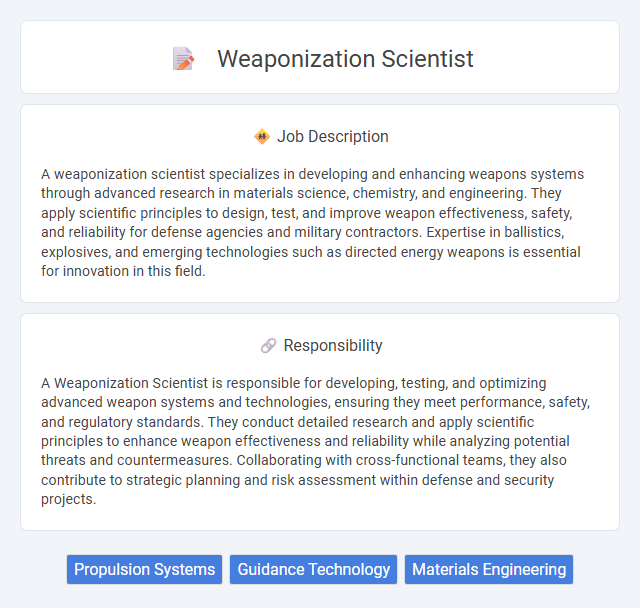
A weaponization scientist specializes in developing and enhancing weapons systems through advanced research in materials science, chemistry, and engineering. They apply scientific principles to design, test, and improve weapon effectiveness, safety, and reliability for defense agencies and military contractors. Expertise in ballistics, explosives, and emerging technologies such as directed energy weapons is essential for innovation in this field.
Individuals with a strong aptitude for scientific research and ethical considerations might find a career as a weaponization scientist challenging yet fitting, given the high-pressure environment and the moral complexities involved. Those who demonstrate resilience, critical thinking, and a capacity to handle sensitive information are more likely to thrive in this role. People prone to ethical dilemmas or stress-related conditions might find this career path less suitable due to the intense responsibility and potential consequences of their work.
Qualification
A weaponization scientist typically requires an advanced degree in physics, chemistry, microbiology, or engineering, with specialized training in chemical, biological, radiological, or nuclear (CBRN) materials. Extensive knowledge of safety protocols, risk assessment, and regulatory compliance is essential for handling hazardous substances and developing defense mechanisms. Experience in research and development, combined with strong analytical and problem-solving skills, ensures effective design and mitigation of weapon systems.
Responsibility
A Weaponization Scientist is responsible for developing, testing, and optimizing advanced weapon systems and technologies, ensuring they meet performance, safety, and regulatory standards. They conduct detailed research and apply scientific principles to enhance weapon effectiveness and reliability while analyzing potential threats and countermeasures. Collaborating with cross-functional teams, they also contribute to strategic planning and risk assessment within defense and security projects.
Benefit
The role of a weaponization scientist likely offers significant benefits in advancing national security and defense technology through innovative research and development. Professionals in this field may experience opportunities for highly specialized skill acquisition, contributing to cutting-edge projects with substantial societal impact. Job stability and competitive compensation are probable advantages due to the critical nature of their work within government or private defense sectors.
Challenge
Weaponization scientists likely face significant challenges in balancing innovation with ethical responsibilities, as they work to develop advanced defense technologies. The complexity of integrating cutting-edge science into practical applications may require continuous problem-solving and adaptation to rapidly changing security threats. The probability of intense regulatory scrutiny and the need for strict compliance with international laws could further complicate their work environment.
Career Advancement
Specializing as a weaponization scientist offers significant career advancement opportunities through roles in research and development, defense contracting, and government agencies such as the Department of Defense or national laboratories. Progression typically includes moving from junior scientist positions to senior researcher, project lead, and eventually management roles, often requiring advanced degrees like a PhD in chemistry, physics, or engineering. Expertise in materials science, explosive chemistry, and regulatory compliance enhances promotion potential and access to cutting-edge projects in national security and defense technology.
Key Terms
Propulsion Systems
Weaponization scientists specializing in propulsion systems design and develop advanced propulsion technologies to enhance missile and projectile performance in military applications. Their expertise includes analyzing thrust dynamics, fuel efficiency, and material durability to optimize speed, range, and accuracy of weapon delivery mechanisms. They collaborate with aerospace engineers and defense contractors to innovate propulsion units compatible with modern weapon systems while ensuring compliance with safety and regulatory standards.
Guidance Technology
A Weaponization Scientist specializing in Guidance Technology develops advanced targeting systems to enhance missile precision and effectiveness. They utilize expertise in navigation algorithms, sensors, and control systems to design and test guidance mechanisms for various weapon platforms. Their work ensures improved accuracy, reliability, and strategic advantage in defense applications.
Materials Engineering
Weaponization scientists specializing in Materials Engineering develop advanced materials to enhance the durability, efficiency, and safety of weapons systems. They analyze the mechanical, thermal, and chemical properties of metals, composites, and polymers to optimize performance under extreme conditions. Expertise in nanomaterials, metallurgy, and additive manufacturing enables innovation in lightweight armor, explosive formulations, and structural components critical to defense technology.
 kuljobs.com
kuljobs.com